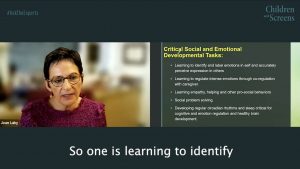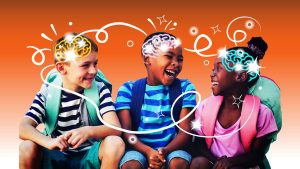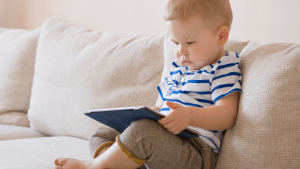
Joan Luby, MD, (Samuel and Mae S. Ludwig Professor of Child Psychiatry, Washington University School of Medicine) explains why screen-free and person-to-person interactions in early childhood are crucial for relational development in this clip at our #AskTheExperts webinar “Early Childhood Mental Health and Digital Media” on May 1, 2024.
Read the Video Transcript
[Dr. Joan Luby]: There are really critical social and emotional developmental tasks that children need to achieve in the first few years of life. And these tasks really require in-person live interactions with human caregivers. And they are things that screens cannot provide and that screens will likely interfere with. So one is learning to identify and label emotions in themselves and others and to accurately perceive emotions in others – a critical, foundational emotional skill essential to later mental health. The other – learning to regulate intense emotions, this best done through co-regulation with a caregiver. Learning empathy, helping, and other prosocial behaviors. Again, these are things that can only be achieved in early childhood in the presence of other human beings modeling these types of behaviors. Along this line is social problem solving. Another key feature that we’ve more recently been learning about is the importance of developing regular circadian rhythms and sleep. We now know that this is actually a fundamental need for healthy brain development. And screen use may very much interfere with this.
View the full webinar

Early Childhood Mental Health and Digital Media
How does digital media use affect early child development and mental health? How should care providers approach technology use in order to protect and promote mental health in young children (ages 0-5)?
Dimitri Christakis, MD, MPH
Director of the Center for Child Health, Behavior and Development, Seattle Children’s Research Institute; Chief Science Officer, Children and Screens
Gilbert Foley, EdD
Consulting Clinical Psychologist, New York Center for Child Development; Clinical Co- Director, NYC Early Childhood Mental Health Training and Technical Assistance Center
Stephanie Jones, PhD
Gerald S. Lesser Professor of Child Development and Education, Harvard Graduate School of Education
Lisa Linder, PhD
Licensed Clinical Psychologist, Professor of Child and Family Development, San Diego State University
Joan Luby, MD
Samuel and Mae S. Ludwig Professor of Child Psychiatry, Washington University School of Medicine





